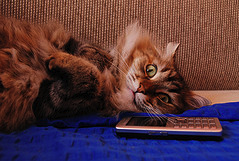FCC Yells At 2 Million People To Turn Those Darn Cell Phone Signal Boosters Off, Changes Its Mind

(kfas)
What’s an average citizen to do if they can’t get a cell phone call to go through, perhaps because they live far from cell towers or their network is just shoddy? About 2 million people in the United States currently use wireless signal boosters, devices that can help strengthen cell phone signals. The Federal Communications Commission adopted new rules on those yesterday, at first saying everyone would have to turn them off and get permission from carriers, but backpedaling shortly after.
Ars Technica says that at first, the FCC had a FAQ page on the new rules that said consumers would have to get permission from their carriers to keep their boosting devices on, and if the carrier said no they’d have to turn it off. But they shortly afterward updated the new rules to say existing boosters could stay on unless they interfere with wireless networks.
Did the FCC recently adopt new rules for signal boosters?
Yes. The FCC recently adopted new rules to improve signal booster design so these devices won’t cause interference to wireless networks. The FCC also adopted new rules about what cell phone users need to do before using a signal booster.I already have a signal booster; do I need to do anything?
If a wireless provider or the FCC asks you to turn off your signal booster because it is causing interference to a wireless network, you must turn off your booster and leave it off until the interference problem can be resolved. When the new rules go into effect, you will be able to purchase a booster with additional safeguards that protect wireless networks from interference.
However for anyone who doesn’t own a signal booster yet, the agency adds:
I’d like to buy a signal booster today, what should I do?
Signal boosters with additional safeguards that meet the new rules are not available for sale yet. We expect new signal boosters will be available by the end of the 2013. Most wireless providers, including AT&T, Sprint, T–Mobile, and Verizon, have indicated they will authorize the use of these new signal boosters.
That being said, booster manufacturers have been given a year to clear out their current inventories so you might be fine buying one today.
The FCC then displays what a label will probably look like saying a booster is approved by the FCC. It’s unclear so far what the registration process will entail or how to get provider consent, but Ars Technica cites one booster maker who says it probably won’t involve a fee.
You’ll likely be able to use any booster approved by the FCC, unless your carrier decides it’s interfering with the wireless network in your area.
FCC Chairman Julius Genachowski seems optimistic that this will work out both for consumers and wireless carriers:
“One of the things that helped facilitate an outcome here was the commitment by a number of carriers to provide that consent,” Genachowski said. “Our goal is to put in place clear rules of the road that enable and authorize signal boosters for consumers as quickly as possible, but as part of a framework that prevents interference. We all said, ‘You know what, this is the fastest way to get from A to B. Meanwhile, we’re going to monitor this.’ We expect it to work but we haven’t ruled out other options for the future if for some reason it doesn’t.”
FCC orders 2M people to power down cell phone signal boosters (Updated) [Ars Technica]
Want more consumer news? Visit our parent organization, Consumer Reports, for the latest on scams, recalls, and other consumer issues.

